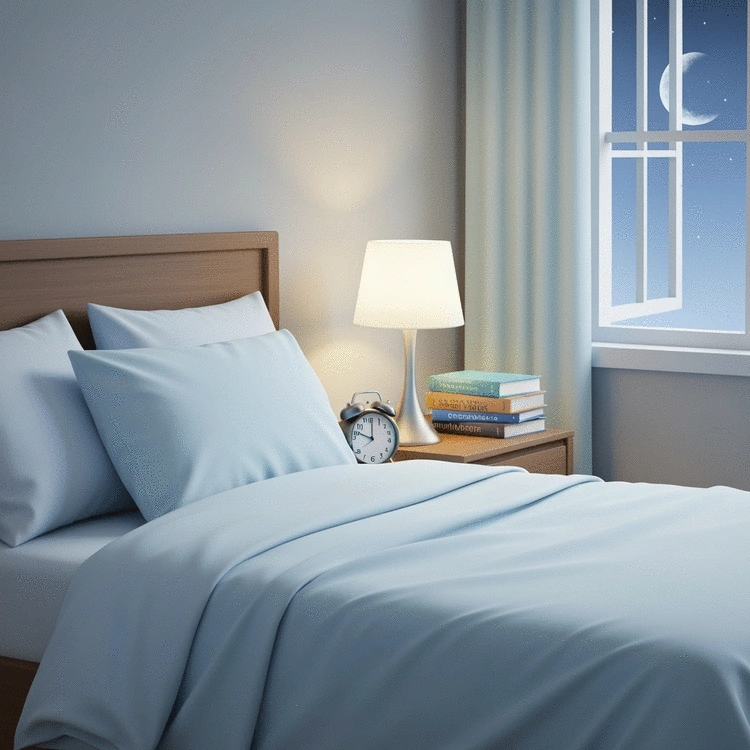What if the key to a healthier life lies in something as simple as your bedtime? Recent research has unveiled compelling evidence that early bedtimes can significantly enhance both physical and mental well-being. Let's explore these insights together!
What You Will Learn
- Individuals who go to bed before 10 PM report improved health outcomes and vitality.
- Early bedtime is linked to lower levels of stress and anxiety, contributing to better mental health.
- Establishing a consistent pre-sleep routine can enhance sleep quality and overall health.
- Quality sleep plays a crucial role in preventing chronic diseases and boosts cognitive function.
Insights into Early Bedtime and Health Outcomes
Research highlights the significant impact of consistent early bedtimes on overall health, vitality, and reduced chronic illness. Below, we compare key findings and expert recommendations.
Key Findings from 20,000 Adults Study
- •Better health & vitality with bedtimes before 10 PM.
- •Significant reduction in sleep-related health issues.
- •Lower stress & anxiety levels correlated with early bedtimes.
Expert Tips for Better Bedtime Routines
- •Create a calming pre-sleep ritual.
- •Avoid screens at least an hour before bed.
- •Maintain a consistent sleep schedule.
Understanding the Impacts of Early Bedtime on Overall Health
At The Stone Builders Rejected, we're not just about technology and startups; we're also keen on the little things that have a big impact on our lives—like sleep! Understanding the effects of an early bedtime on our overall health can lead to significant improvements in well-being. Recent studies shed light on how going to bed earlier might just be the key to unlocking better physical and mental health.
Research shows that sleep patterns play a vital role in our daily lives. By exploring these patterns, we can uncover insights that help us manage our health more effectively. So, let’s dive into what the latest research tells us about the crucial relationship between sleep and health!

What Research Reveals About Sleep Patterns
In an extensive study involving over 20,000 adults, researchers found some eye-opening insights. This massive study aimed to explore the connection between sleep duration and overall health outcomes. Here are some key findings:
- Individuals who consistently go to bed before 10 PM report better health and vitality.
- A significant reduction in sleep-related health issues was observed among early sleepers.
- Early bedtimes are correlated with lower levels of stress and anxiety.
These findings suggest that our bedtime routines might be more critical than we realize. The collective data gives us a clearer picture of how sleep impacts our health—something we can all benefit from understanding.
The Massive Study of 20,000 Adults: Key Findings
One striking aspect of the study was the clear link between early bedtimes and reduced incidence of chronic illnesses. Participants who adhered to an early sleep schedule reported feeling more energized and focused during the day. This could be a game-changer for those of us juggling busy lives, as it emphasizes the importance of prioritizing sleep. For instance, research from the National Heart, Lung, and Blood Institute (NHLBI) highlights that earlier bedtimes can significantly help teenagers achieve more sleep, which is crucial for their developing bodies and minds.
Insights from Sleep Experts on Bedtime Routines
Sleep experts underscore the importance of establishing a consistent bedtime routine. They suggest that small changes can lead to substantial improvements in sleep quality. Here are some expert tips:
- Create a calming pre-sleep ritual to signal your body that it's time to wind down.
- Avoid screens at least an hour before bedtime to reduce blue light exposure.
- Maintain a consistent sleep schedule, even on weekends, to reinforce your body's natural rhythms. The Sleep Foundation emphasizes the benefits of waking up early as part of a consistent sleep hygiene routine, contributing to better overall health.
By integrating these practices, you might discover that hitting the sack a bit earlier could transform both your nights and your days.
The Role of Circadian Rhythm in Sleep Quality
Understanding our biological clock, or circadian rhythm, is crucial for appreciating how early bedtimes affect our health. This internal clock regulates sleep-wake cycles and influences numerous bodily functions. Disruption of this rhythm can lead to various health challenges, emphasizing the need for a consistent sleep schedule.
So, how does the circadian rhythm influence our overall well-being? It's all about synchronization! When we sleep in alignment with our natural cycles, we're more likely to experience restorative sleep, which supports our mental and physical health.
Understanding the Biological Clock and Its Influence on Health
The timing of sleep is just as important as the amount of sleep we get! A well-aligned circadian rhythm can help improve our metabolism, mood, and cognitive function. For many, this means seeking opportunities to embrace earlier bedtimes and fostering better sleep hygiene. The American Psychological Association notes that syncing school start times with adolescent sleep patterns, which are governed by circadian rhythms, can lead to significant improvements in student well-being and academic performance.
In closing this section, I encourage you to reflect on your own sleep habits. Are you part of the early bedtime club? If not, perhaps it's time to consider how an earlier bedtime could positively impact your life. The journey to better health starts with sleep!
Interactive Poll: Your Sleep Habits
We want to know how you approach your bedtime! What time do you usually go to sleep? Share your response below:
Frequently Asked Questions About Early Bedtimes
Here are some common questions regarding early bedtimes and their impact on health:
- What defines an "early bedtime"? Generally, an early bedtime is considered to be consistently going to bed before 10 PM, though this can vary based on individual needs and circadian rhythms.
- How does an early bedtime improve health? Early bedtimes are linked to better overall health, vitality, reduced chronic illness risks, lower stress and anxiety levels, improved mood stability, and enhanced cognitive function.
- What role does the circadian rhythm play in sleep quality? The circadian rhythm is your body's natural internal clock. Aligned sleep with this rhythm ensures more restorative sleep, which supports mental and physical health.
- What are some expert tips for establishing a better bedtime routine? Experts recommend creating a calming pre-sleep ritual, avoiding screens at least an hour before bed, and maintaining a consistent sleep schedule, even on weekends.
- How does sleep deprivation affect productivity? Lack of sleep can lead to decreased cognitive function, increased stress levels, and lowered physical performance, significantly impacting daily productivity and overall well-being.

Summarizing the Benefits of Early Bedtime for Better Living
As we dive into the growing body of research surrounding sleep, it becomes increasingly clear that adopting an early bedtime can profoundly impact our overall health. From physical wellness to mental clarity, the benefits are hard to ignore. Here’s a quick list of key advantages of embracing an early sleep schedule:
- Reduced risk of chronic diseases: Quality sleep plays a crucial role in preventing conditions like obesity, diabetes, and heart disease.
- Improved mood stability: Sleep deprivation is linked to heightened anxiety and irritability, while adequate rest enhances emotional regulation.
- Boosted cognitive function: Early bedtimes can lead to better concentration, memory retention, and overall mental performance.
- Enhanced productivity: With quality sleep, you’re more likely to feel energized and focused throughout the day.
These findings highlight the importance of prioritizing our sleep habits for better health outcomes. Personally, I’ve experienced the positive shifts that come from adjusting my sleep schedule. It’s amazing how just a few extra hours of rest can transform your day!
Key Takeaways from the Study and Expert Opinions
Reflecting on the insights gleaned from the research and expert discussions, it’s evident that early bedtimes are not just a trend but a necessity for optimal health. Here’s what you need to know:
- Studies consistently show that individuals who sleep early report better health outcomes.
- Experts recommend aiming for 7-9 hours of sleep, ensuring that you wake up refreshed and ready to tackle the day.
- Incorporating a consistent bedtime routine helps regulate your body clock, promoting deeper and more restorative sleep.
The consensus is clear: sleep is foundational to health. As the founder of The Stone Builders Rejected, I believe we must advocate for better sleep hygiene practices in our communities. Sleep is as vital as nutrition and exercise!
Encouragement to Prioritize Sleep for Healthier Living
It’s easy to overlook sleep amidst our busy schedules, but it’s essential to view this time as an investment in our health. Prioritizing sleep means setting aside distractions and creating an environment conducive to rest. Here’s how you can start:
- Set a regular bedtime and wake-up time, even on weekends.
- Create a calming pre-sleep routine: think warm baths, reading, or gentle stretches.
- Avoid screens and bright lights an hour before bed to help your body wind down.
These simple changes can lead to significant improvements in your daily life. I encourage everyone to take a moment to evaluate their own sleep habits—what adjustments can you make today for a healthier tomorrow?
The Impact of Sleep Deprivation on Productivity and Well-Being
We often underestimate the critical role sleep plays in our productivity levels. Lack of sleep can lead to decreased performance, difficulty concentrating, and lower motivation. The implications are serious, especially in the fast-paced environments many of us operate in. Here’s a brief overview of how sleep deprivation affects us:
- Decreased cognitive function: Poor sleep hampers our ability to think clearly and make decisions.
- Increased stress levels: A lack of rest can elevate cortisol levels, leading to a cycle of stress and sleeplessness.
- Lowered physical performance: Whether in sports or daily activities, fatigue diminishes our physical capabilities.
Recognizing these effects is the first step towards making necessary changes. By committing to an earlier bedtime, we can create a ripple effect of positivity in our lives, enabling us to be more productive and balanced. As I always say, let’s prioritize our well-being—after all, a good night’s sleep is a cornerstone of a fulfilling life!
Recap of Key Points
Here is a quick recap of the important points discussed in the article:
- Early Bedtime Benefits: Consistently going to bed before 10 PM correlates with better health and vitality.
- Health Improvements: Early sleepers experience fewer sleep-related health issues and reduced levels of stress and anxiety.
- Consistent Routine: Establishing a calming pre-sleep ritual and avoiding screens before bed can enhance sleep quality.
- Circadian Rhythm: Aligning sleep with your biological clock supports better overall health and improves cognitive function.
- Sleep's Impact on Productivity: Adequate rest boosts energy levels, focus, and overall productivity throughout the day.






